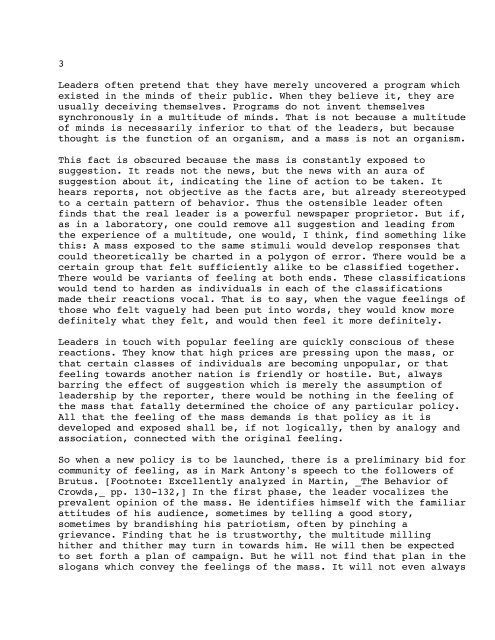PUBLIC OPINION by WALTER LIPPMANN TO FAYE LIPPMANN ...
PUBLIC OPINION by WALTER LIPPMANN TO FAYE LIPPMANN ...
PUBLIC OPINION by WALTER LIPPMANN TO FAYE LIPPMANN ...
Create successful ePaper yourself
Turn your PDF publications into a flip-book with our unique Google optimized e-Paper software.
3<br />
Leaders often pretend that they have merely uncovered a program which<br />
existed in the minds of their public. When they believe it, they are<br />
usually deceiving themselves. Programs do not invent themselves<br />
synchronously in a multitude of minds. That is not because a multitude<br />
of minds is necessarily inferior to that of the leaders, but because<br />
thought is the function of an organism, and a mass is not an organism.<br />
This fact is obscured because the mass is constantly exposed to<br />
suggestion. It reads not the news, but the news with an aura of<br />
suggestion about it, indicating the line of action to be taken. It<br />
hears reports, not objective as the facts are, but already stereotyped<br />
to a certain pattern of behavior. Thus the ostensible leader often<br />
finds that the real leader is a powerful newspaper proprietor. But if,<br />
as in a laboratory, one could remove all suggestion and leading from<br />
the experience of a multitude, one would, I think, find something like<br />
this: A mass exposed to the same stimuli would develop responses that<br />
could theoretically be charted in a polygon of error. There would be a<br />
certain group that felt sufficiently alike to be classified together.<br />
There would be variants of feeling at both ends. These classifications<br />
would tend to harden as individuals in each of the classifications<br />
made their reactions vocal. That is to say, when the vague feelings of<br />
those who felt vaguely had been put into words, they would know more<br />
definitely what they felt, and would then feel it more definitely.<br />
Leaders in touch with popular feeling are quickly conscious of these<br />
reactions. They know that high prices are pressing upon the mass, or<br />
that certain classes of individuals are becoming unpopular, or that<br />
feeling towards another nation is friendly or hostile. But, always<br />
barring the effect of suggestion which is merely the assumption of<br />
leadership <strong>by</strong> the reporter, there would be nothing in the feeling of<br />
the mass that fatally determined the choice of any particular policy.<br />
All that the feeling of the mass demands is that policy as it is<br />
developed and exposed shall be, if not logically, then <strong>by</strong> analogy and<br />
association, connected with the original feeling.<br />
So when a new policy is to be launched, there is a preliminary bid for<br />
community of feeling, as in Mark Antony's speech to the followers of<br />
Brutus. [Footnote: Excellently analyzed in Martin, _The Behavior of<br />
Crowds,_ pp. 130-132,] In the first phase, the leader vocalizes the<br />
prevalent opinion of the mass. He identifies himself with the familiar<br />
attitudes of his audience, sometimes <strong>by</strong> telling a good story,<br />
sometimes <strong>by</strong> brandishing his patriotism, often <strong>by</strong> pinching a<br />
grievance. Finding that he is trustworthy, the multitude milling<br />
hither and thither may turn in towards him. He will then be expected<br />
to set forth a plan of campaign. But he will not find that plan in the<br />
slogans which convey the feelings of the mass. It will not even always





